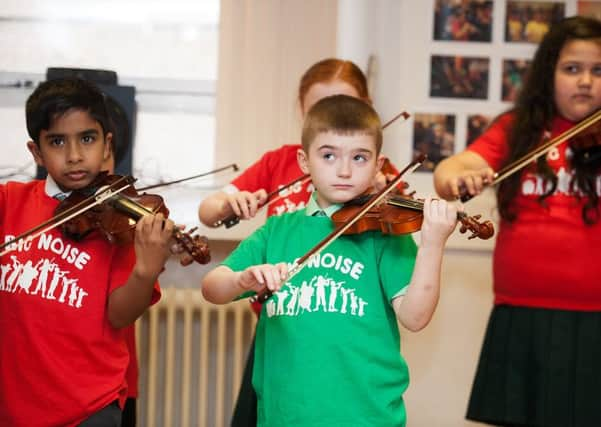Jane Bradley: Here's why free music tuition for kids is so important


When I was nine, I was summoned into the school hall and made to sing back a variety of notes played by a lady sitting at the piano.
It turned out I must have done it pretty well, as a week later, I was handed a small-person-size violin and told to attend class-time lessons with the lady, a legendary teacher who dedicated her life to inspiring generations of children from what was not exactly an economically thriving area.
Advertisement
Hide AdAdvertisement
Hide AdThree years later, while temporarily at school in Canada, I was presented with a different form of free music tutition. Everyone in my music class – part of the weekly eighth grade timetable at my state high school – was handed a wind instrument and told to learn from scratch from a book. It created what was essentially a class band in every class. While this perhaps wasn’t the most effective way to create skilled musicians – and probably gave my mum the heebie jeebies when I brought home a flute which was shared with students in four other classes, being dunked in a bucket of disinfectant between owners – it gave me a chance to try out another instrument. Once back in the UK, I convinced the visiting council woodwind teacher to let me join in a group class and learned to play properly.
Both instruments opened up a world of music to me, which lasted for years. Orchestras, bands, a weekly choir run by my violin teacher. A residential music camp which I was lucky enough to attend as a teenager, which introduced me to a group of fellow musicians, many of whom I still count as good friends today. I even had the chance to play a flute solo in front of an audience at the Royal Festival Hall in London.
Now, after a gap of 15 years or so, as real life took over, I’m finally picking up music again and watching as my daughter starts to show an interest in learning an instrument. Without the free school music tuition I was lucky enough to get, none of this would have happened.
It wasn’t even just the money. We weren’t exactly rich, but my parents could probably have afforded the odd extra curricular lesson for me. It was the fact that, not being musicians themselves in any way, shape or form, it probably would never have occurred to them to suggest that I learned an instrument if free school music lessons hadn’t have been on offer. We were not a musical family. At least one of my parents is completely tone deaf. It turned out through some quirk of genetics that I wasn’t, but we might never have found that out.
Two years ago, a study by the Instrumental Music Teachers’ Network warned that there were nine Scottish councils which had already identified budget cuts for music tuition. It said at the time that the biggest cut was being made in West Lothian, which this week took plans to council committee to axe all strings and percussion tuition in the council’s schools.
Under plans discussed by the committee earlier this week, which will be taken to full council on Tuesday, no child in the region will learn the violin, cello or viola. let alone drums, in the West Lothian council area. What’s more, the Bathgate Academy string ensemble, Linlithgow Academy string orchestra and junior strings, St Kentigern’s folk/string group, West Lothian Sinfonia and West Lothian Folk Group will all be disbanded. The council claims the move is necessary to preserve free tuition in brass, woodwind and piping. Parents and music teachers are fighting the decision tooth and nail, with the support of local politicians, who warn that the move is a major mistake. West Lothian MP Hannah Bardell, who herself benefited from brass tuition while at school in the local authority two decades ago, tells me that learning an instrument brought her “huge benefits and confidence”.
“The social, physical and mental health benefits to young folk are easy to calculate,” she says. “The Save Our Strings campaign has gathered huge support from across the music industry and the local community. I hope the council leadership are listening carefully and reconsider their plans, which will have a disastrous impact on the young people of West Lothian if they go ahead.”
There is no doubt that there is a public appetite for children to learn music. In Edinburgh last year, proposals to carve up the renowned City of Edinburgh Music School at Flora Stevenson and Broughton High schools in a bid to save £383,000 were reversed after a backlash which garnered support from the likes of Garbage lead singer Shirley Manson, the family of late Celtic fusion star Martyn Bennett and jazz musician Tommy Smith.
Advertisement
Hide AdAdvertisement
Hide AdYet, what is happening is West Lothian is arguably even more dramatic. While cuts to the City of Edinburgh Music School would have shaken up tuition for children who are already deemed to be talented – and are at an advanced level of their music attainment – if the cuts in West Lothian go through, it would not see any string players or percussionists even get close to reaching that stage.
Furthermore, as projects such as the Venezuelan-inspired El Sistema in various parts of Scotland has shown, music can have huge benefits for disadvantaged children. In Rapploch in Stirling, where a similar project called Big Noise has run for nine years, inspectors last year found that it increased children’s self-esteem, confidence and team work. Music tuition is not simply about the music.
It is about the world of opportunities which are opened up to youngsters. Let’s not throw it away.